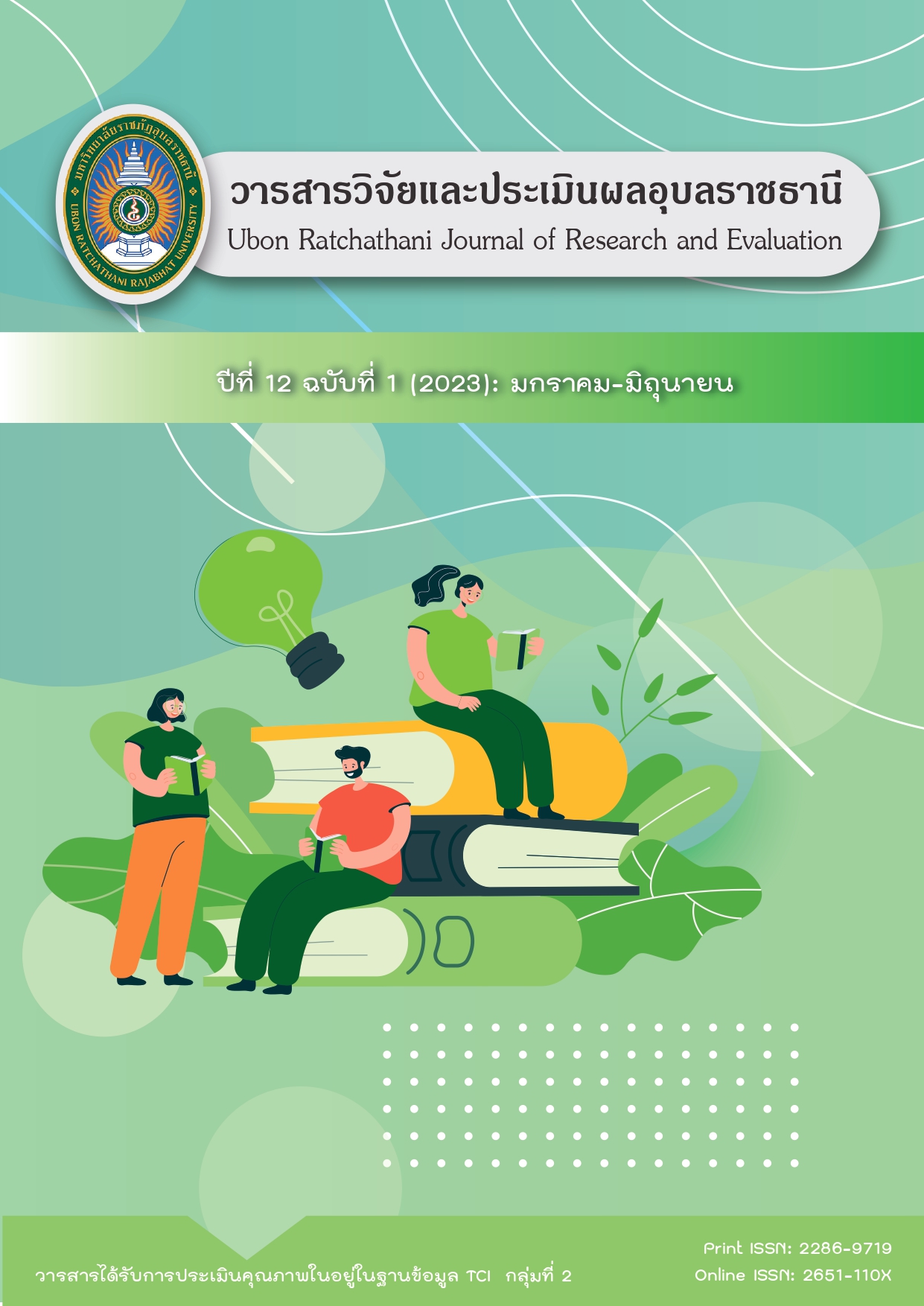Development of Board Games for Learning Based on Conjugation of the Verb -te- Form in Japanese to Improve the Japanese Language Achievement of Mathayom Suksa 5 Students
Keywords:
Board Games for Learning, Conjugation of the Verb, the Verb -te- FormAbstract
The purposes of this research were to 1) develop Board Games based on Conjugation of the Verb -te- Form in Japanese to improve the Japanese Language Learning Achievement of Mathayom Suksa 5 Students, based on standardized criteria of 75/75, 2) compare the students’ learning achievement before and after using board games, and 3) combine with the students’ satisfaction of the use of board games as a learning tool. The sample group consisted of 20 Mathayom Suksa 5 Students at TriamUdomSuksa Pattanakarn Ubonratchathani School, under The Secondary Educational Service Area Ubon Ratchathani Amnat Charoen. The samples were selected by using the cluster random sampling method. The primary data was conducted by carrying out a test for a period of 14 hours. A one-group pretest-posttest design was used in the study. The research instruments were; Board Games for Learning,, The Multiple-Choice Learning Achievement Test of 56 items, and The Satisfaction Evaluation Form of 26 items. The collected data was analyzed by using percentage, mean, standard deviation and t-test.
The research findings were as follows:
1. The developed Board Games for Learning Based on Conjugation of the Verb -te- Form in Japanese was proved to be efficient, as it revealed an efficiency indices of 79.95/79.64, which surpassed the standardized criteria of 75/75.
2. The students’ achievement after using The Board Games for Learning Based on Conjugation of the Verb -te- Form in Japanese was statistically higher than that before using them at the .01 level.
3. Students’ satisfaction with learning by developed Board Games for Learning Based on Conjugation of the Verb -te- Form in Japanese has proven to be very high.
References
กระทรวงศึกษาธิการ. (2556). ตัวชี้วัดและสาระการเรียนรู้ ภาษาญี่ปุ่นและภาษาเยอรมัน ตามหลักสูตรแกนกลาง
การศึกษาขั้นพื้นฐาน พุทธศักราช 2551 กลุ่มสาระการเรียนรู้ภาษาต่างประเทศ. กรุงเทพฯ: องค์การค้า
ของ สกสค.
คณะวิทยาการเรียนรู้และศึกษาศาสตร์ มหาวิทยาลัยธรรมศาสตร์. (2562). ออกแบบเกม ออกแบบสังคม.
กรุงเทพฯ: เอส.อาร์.พริ้นติ้ง แมสโปรดักส์.
เตวิช เสวตไอยาราม. (2560) การเรียนรู้รูป て ของผู้เรียนภาษาญี่ปุ่นชาวไทย. ญี่ปุ่นศึกษา, 34(2), 26-36.
ธีรวุฒิ เอกะกุล. (2561). ระเบียบวิธีวิจัย. (พิมพ์ครั้งที่ 2). อุบลราชธานี: วิทยาการพิมพ์.
ลดาวัลย์ แย้มครวญ. (2559). การออกแบบและพัฒนาเกมเพื่อการเรียนรู้สำหรับวิชาคณิตศาสตร์ ชั้นประถมศึกษา
ปีที่ 6. (วิทยานิพนธ์วิทยาการสารสนเทศมหาบัณฑิต สาขาเทคโนโลยีสารสนเทศ). มหาวิทยาลัย
เทคโนโลยีสุรนารี, นครราชสีมา.
วิวัฒน์ไชย วรบวร. (2555). เกมเบ็ดเตล็ด. กรุงเทพฯ: โอเดียนสโตร์.
สมจิต จันจุฬา. (2551). ผลการใช้บอร์ดเกมที่มีต่อการสะกดคำศัพท์ภาษาอังกฤษ ของนักเรียนชั้นประถมศึกษา
ปีที่ 4. (วิทยานิพนธ์ปริญญาการศึกษามหาบัณฑิต สาขาวิชาหลักสูตรและการสอน). มหาวิทยาลัย
มหาสารคาม, มหาสารคาม.
อาริสา ใจห้าว. (2554). ผลของการใช้เกมเพื่อการเรียนรู้คำศัพท์ภาษาอังกฤษ ของนักเรียนระดับชั้นมัธยมศึกษา
ปีที่ 2. (วิทยานิพนธ์ศิลปศาสตร์มหาบัณฑิต สาขาวิชาภาษาอังกฤษ). มหาวิทยาลัยนเรศวร, พิษณุโลก.
อรรถเศรษฐ์ ปรีดากรณ์. (2557). การออกแบบบอร์ดเกมการศึกษาเรื่องวงสีธรรมชาติ สำหรับนักเรียนชั้น
ประถมศึกษาปีที่ 6. (วิทยานิพนธ์ปริญญาการศึกษามหาบัณฑิต สาขาวิชาศิลปศึกษา).
มหาวิทยาลัยศรีนครินทรวิโรฒ, กรุงเทพมหานคร.
อิซาโอะ ยามากิ. (2559) สถานการณ์การเลือกเรียนภาษาญี่ปุ่นในสถาบันอุดมศึกษา ของนักเรียนชั้นมัธยมศึกษา
ตอนปลายในภาคเหนือ. วารสารวิชาการมหาวิทยาลัยฟาร์อีสเทอร์น, 10(2), 52-62.
Deasy, Indriawan. (2016) Improving Students’ Participation in Learning English by Using English
Board Game. (The Undergraduate Degree of Education English Education Department
Teacher Training and Education Faculty). Sebelas MaretUniversity, Indonesia.
Kai L. Chan. (2016). POWER LANGUAGE INDEX Which are the world’s most influential languages?
Distinguished Fellow. Retrieved May, 2021, from:
https://www.kailchan.ca/wp-content/uploads/2016/12/Kai-Chan_Power-Language-
Index-full-report_2016_v2.pdf
Karl M. Kapp. (2012). The Gamification of Learning and Instruction: Game-based Methods and
Strategies for Training and Education. United Kingdom: John Wiley & Sons, Inc.
Downloads
Published
How to Cite
Issue
Section
License
Copyright (c) 2023 Ubon Ratchathani Journal of Research and Evaluation

This work is licensed under a Creative Commons Attribution-NonCommercial-NoDerivatives 4.0 International License.
1. บทความที่ตีพิมพ์ในวารสารนี้ได้มีการตรวจสอบการลอกเลียนงานวรรณกรรมแล้ว ไม่เกินร้อยละ 25
2. บทความที่ตีพิมพ์ในวารสารนี้เป็นข้อคิดเห็น ข้อค้นพบของผู้เขียนบทความ โดยผู้เขียนบทความต้องเป็นผู้รับผิดชอบต่อผลทางกฎหมายใด ๆ ที่อาจเกิดขึ้นจากบทความนั้น ๆ
3. บทความ ข้อมูล เนื้อหา รูปภาพ ฯลฯ ที่ได้รับการตีพิมพ์ในวารสารวิจัยและประเมินผลอุบลราชธานี ถือเป็นลิขสิทธิ์ของวารสารวิจัยและประเมินผลอุบลราชธานี หากบุคคลหรือหน่วยงานใดต้องการนำทั้งหมดไปเผยแพร่ต่อหรือเพื่อกระทำการใดๆ จะต้องได้รับอนุญาตเป็นลายลักษณ์อักษรจากวารสารวิจัยและประเมินผลอุบลราชธานีก่อนเท่านั้น และจะต้องมีการอ้างอิงวารสารวิจัยและประเมินผลอุบลราชธานี ฉบับนั้น ๆ ด้วย






